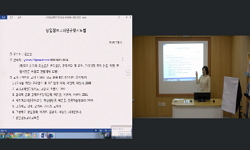본고는 이러한 주장을 편 가장 대표적인 재야 지식인인 존 브라운과 조우십 프리스틀리의 담론을 차례로 분석하려고 한다. 존 브라운이 첫 번째 주장을 대표한다면, 이를 반박하고 나선 조...
http://chineseinput.net/에서 pinyin(병음)방식으로 중국어를 변환할 수 있습니다.
변환된 중국어를 복사하여 사용하시면 됩니다.
- 中文 을 입력하시려면 zhongwen을 입력하시고 space를누르시면됩니다.
- 北京 을 입력하시려면 beijing을 입력하시고 space를 누르시면 됩니다.
18세기 영국의 자유론_preprint
한글로보기https://www.riss.kr/link?id=G3805876
- 저자
- 발행기관
-
발행연도
2000년
-
작성언어
Korean
- 주제어
-
자료형태
한국연구재단(NRF)
-
0
상세조회 -
0
다운로드
부가정보
국문 초록 (Abstract)
본고는 이러한 주장을 편 가장 대표적인 재야 지식인인 존 브라운과 조우십 프리스틀리의 담론을 차례로 분석하려고 한다. 존 브라운이 첫 번째 주장을 대표한다면, 이를 반박하고 나선 조우십 프리스틀리는 두번째 주장을 대표한다. 그리고 마지막으로 이러한 담론들이 미국 혁명과 프랑스 혁명 시대에 어떻게 변용 되는가를 추적하려고 한다. 이 시대에 들어와 급진적 정치개혁을 요구하는 급진파(radicals)들이 등장하면서 자유에 대한 담론은 인간이 주권자가 될 수 있는가 하는 문제로 귀착되었다. 상업 사회의 도래로 나타난 부패 정치체제를 개혁하기 위해서는 인민이 주권자로서의 자유를 되찾아야 한다는 주장이 제기된 것이다. 이때 자유는 곧 자치 이외에 다른 것이 아니었다. 본고에서는 이러한 주장을 편 가장 대표적 재야 지식인인 리차드 프라이스의 담론을 분석할 것이다. 또한 이러한 주장에 반대하는 보수적 지식인들의 담론들도 검토할 것이다. 이들은 자유란 강제의 부재일 뿐 자치와는 아무 상관도 없는 개념이라고 규정하였다. 어차피 국가 사회는 법이라는 강제에 의해 유지되기 때문에 자유는 완벽히 지켜질 수도 없는 것이며 중요한 것은 안전을 확보하는 것이라고 이들은 주장하였다.
다국어 초록 (Multilingual Abstract)
The commercialization of society in eighteenth-century Britain incurred severe social and political criticisms of Opposition intellectuals.They inveighed against luxury and corruption which prevailed throughout the process of commercialization. They r...
The commercialization of society in eighteenth-century Britain incurred severe social and political criticisms of Opposition intellectuals.They inveighed against luxury and corruption which prevailed throughout the process of commercialization. They regarded luxury and corruption as fatal enemies of virtue and liberty.Discourses of liberty were discoursed in this context.What was liberty? How was it to be preserved?Answers to these questions varied.This paper selected three Opposition intellectuals such as John Brown,Joseph Priestley and Richard Price, representing respectively three typical answers in eighteenth-century Britain.John Brown represented the Spartan view of liberty which emphasized subordination of individual interest to common weal.He insisted that liberty was to be preserved only by adopting the Spartan system of education which could make a man not a private individual but a public virtous citizen.Joseph Priestley refuted this assertion.He insisted that liberty meant keeping the private sphere of individuals from arbitrary intervention and participating in political process to secure the private sphere.He optimistically affirmed that free individual's rational judgement could defeat luxury and corruption without Spartan control.Richard Price defined liberty as self-government.Even though one could keep his own private sphere,he asserted,without an actual share in government he could not be free.Although he modified Priestley's view,he did not agree with John Brown on his pro-Spartan view.He believed that self-governed people could exert and fulfil their virtue.This paper concludes that these discourses on liberty were discoursed in the civic republican paradigm which identified liberty with participation in public sphere and in this respect are still valuable.
국문 초록 (Abstract)
2) 주초록은 본문의 <머리말>의 일부를 발췌한 내용입니다.
1) 정보원의 내용은 논문이 게재된 학술지의 정보입니다. 2) 주초록은 본문의 <머리말>의 일부를 발췌한 내용입니다.
1) 정보원의 내용은 논문이 게재된 학술지의 정보입니다.
2) 주초록은 본문의 <머리말>의 일부를 발췌한 내용입니다.
국문 초록 (Abstract)
Ⅱ. 존 브라운: 상업 대 자유
Ⅲ. 존 브라운: 시민적 자유와 스파르타적 삶
Ⅳ. 조우십 프리스틀리의 비판: 사적 영역의 확보로서이 시민적 자유
Ⅴ. 리차드 프라이스: 자치로서의 자유
Ⅵ. 프라이스에 대한 비판:‘소극적 자유론’
Ⅶ. 맺음말
<Abstract>
Ⅰ. 머리말 Ⅱ. 존 브라운: 상업 대 자유 Ⅲ. 존 브라운: 시민적 자유와 스파르타적 삶 Ⅳ. 조우십 프리스틀리의 비판: 사적 영역의 확보로서이 시민적 자유 Ⅴ. 리차드 프라이...
Ⅰ. 머리말
Ⅱ. 존 브라운: 상업 대 자유
Ⅲ. 존 브라운: 시민적 자유와 스파르타적 삶
Ⅳ. 조우십 프리스틀리의 비판: 사적 영역의 확보로서이 시민적 자유
Ⅴ. 리차드 프라이스: 자치로서의 자유
Ⅵ. 프라이스에 대한 비판:‘소극적 자유론’
Ⅶ. 맺음말
<Abstract>











